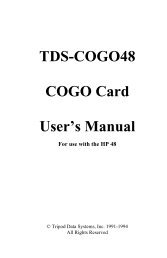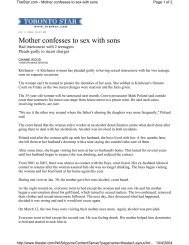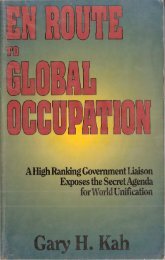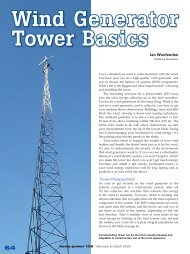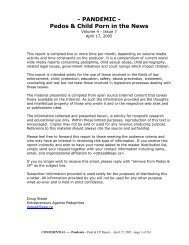G. Edward Griffin - The Fearful Master - PDF Archive
G. Edward Griffin - The Fearful Master - PDF Archive
G. Edward Griffin - The Fearful Master - PDF Archive
Create successful ePaper yourself
Turn your PDF publications into a flip-book with our unique Google optimized e-Paper software.
As for peace in the world, until all nations follow the concept of limited Government, it is<br />
unlikely that universal peace will ever be attained. Unlimited, power-grasping governments<br />
will always resort to force if they think they can get away with it. But there is no doubt that<br />
there can be peace for America. As long as we maintain our military preparedness, the<br />
world's petty despots will leave us alone. 7<br />
To make sure that we do not get caught up in the middle of the endless squabbles<br />
between the countries of Europe, Asia and Africa, we must put an end to the insane<br />
practice of trying to entwine our economic and political affairs with those of the rest of the<br />
world.<br />
Let us, then, move the clock forward to that point where we were when this great nation<br />
was infused with the only really new political concept the world has seen in thousands of<br />
years. Let us throw off these Old World ideas and heed the sage advice of that true<br />
"modernist," George Washington, who told his countrymen:<br />
Observe good faith and justice toward all nations. Cultivate peace and<br />
harmony with all. Religion and morality enjoin this conduct. And can it<br />
be that good policy does not equally enjoin it? . . . Against the insidious<br />
wiles of foreign influence-- I conjure you to believe me, fellow citizens--<br />
the jealousy of a free people ought to be constantly awake; since history<br />
and experience prove that foreign influence is one of the most baneful<br />
foes of republican government. . . . If we remain one people, under an<br />
efficient government, the period is not far off when we may defy material<br />
injury from external annoyance; when we may take such an attitude as<br />
will cause the neutrality we may at any time resolve upon to be<br />
scrupulously respected; when belligerent nations, under the<br />
impossibility of making acquisitions on us, will not likely hazard giving us<br />
provocation; when we may choose peace or war, as our interest, guided<br />
by justice, shall council. Why forego the advantages of so peculiar a<br />
situation? Why, by interweaving our destiny with that of any part of<br />
Europe, entangle our peace and prosperity in the toils of European<br />
ambition, rivalship, interest, humor or caprice?<br />
<strong>The</strong> next time you hear someone speak lightly about sovereignty or national<br />
independence, remember that this was the one single accomplishment of the American<br />
Revolution. Our present involvement in the United Nations has put us right back where the<br />
shooting began in 1775.<br />
<strong>The</strong> Declaration of Independence states:<br />
When in the course of human events, it becomes necessary for one<br />
people to dissolve the political bonds which have connected them with<br />
another, and to assume among the powers of the earth the separate<br />
and equal station to which the laws of nature and nature's God entitles<br />
them, a decent respect to the opinions of mankind requires that they<br />
should declare the causes which impel them to the separation. . . .<br />
It then lists the causes. It is stunning that this bill of grievances and complaints can be<br />
justly applied to the present encroaching tyranny of the United Nations and, to some<br />
extent, our own expanding Federal Government. It speaks of a "multitude of new offices"<br />
and "swarms of officers to harass our people and eat out their substance" (taxes); it


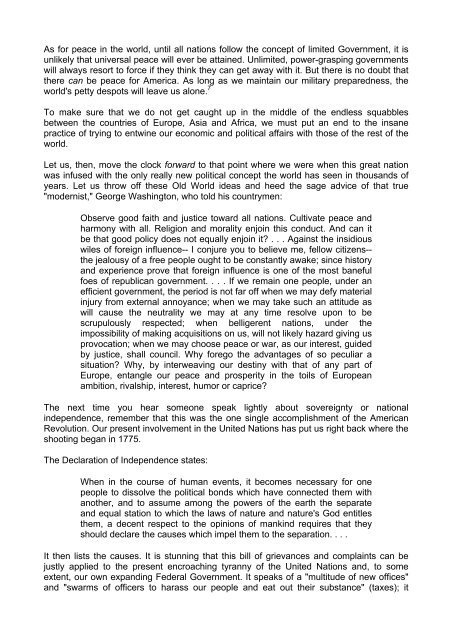
![Robert T McQuaid [rtmq@stn.net] Sent: Friday, October 29, 2004 12 ...](https://img.yumpu.com/51070071/1/190x245/robert-t-mcquaid-rtmqstnnet-sent-friday-october-29-2004-12-.jpg?quality=85)

